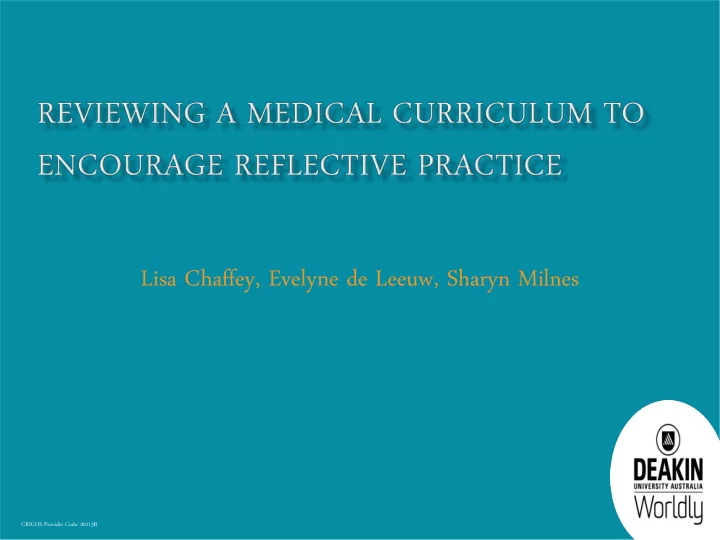

Lisa Chaffey, Evelyne de Leeuw, Sharyn Milnes CRICOS Provider Code: 00113B
DEAKIN CLINICAL SCHOOLS • Geelong • Greater Green Triangle • Grampians • Eastern Health CRICOS Provider Code: 00113B
ETHICS LAW AND PROFESSIONAL DEVELOPMENT Years 1 & 2 Years 3 & 4 CRICOS Provider Code: 00113B
BACKGROUND CRICOS Provider Code: 00113B
ANECDOTAL FEEDBACK CRICOS Provider Code: 00113B
AIMS: • Review the curriculum in regards to reflection • Develop a consistent approach to the facilitation of reflection across all themes and year levels CRICOS Provider Code: 00113B
STUDENT SURVEY • Groningen Reflection Ability Scale (GRAS) • 23-item scale • Three aspects of personal reflection: – self-reflection, – empathetic reflection and – reflective communication CRICOS Provider Code: 00113B
STUDENT SURVEY CRICOS Provider Code: 00113B
STUDENT SURVEY Variable� n� %� GRAS� Scores� � � � � � � � � � � Mean� � � � � � � � � � � � � � � � � � � � � � � � � � � SD� � � � � � � � � � � � � 2011� year� level � � 2 nd � year � 45� 16.42� 87.93� 7.89� 3 rd � year� 51� 18.61� 88.57� 8.01� 4 th � year� 48� 17.51� 90.58� 8.49� 2012� year� level � � 2 nd � year � 52� 18.98� 90.42� 8.56� 3 rd � year� 48� 17.51� 88.06� 8.90� 4 th � year� 30� 10.95� 89.70� 10.48� � CRICOS Provider Code: 00113B
THEN… • Those results lead us to further examine how we facilitate reflection for all themes, throughout the 4 year course CRICOS Provider Code: 00113B
METHOD OF CURRICULUM REVIEW • literature review, gathering best practice guidelines for the facilitation of reflection. • an audit of information, facilitation methods and assessment of reflection within the Public Health theme, and then across the course. • discussions with each of theme leader to determine the purpose of reflection in their unit. CRICOS Provider Code: 00113B
FINDING FROM LITERATURE REVIEW: PURPOSES OF REFLECTION • The term ‘reflection’ is widely mentioned within medical education literature, but often refers to different processes and approaches (7-9) : • We identified the following purposes: – Reflection to improve decision-making ability – Reflection to personally develop – Reflection to contextualize practice. CRICOS Provider Code: 00113B
FINDINGS FORM LITERATURE REVIEW: BEST PRACTICE GUIDELINES • The review also allowed best practice guidelines for facilitating reflection to be developed. CRICOS Provider Code: 00113B
CRICOS Provider Code: 00113B
RESULTS - AUDIT • Public Health theme indicated a good adherence to best practice methods, as compared to the literature review. • An audit of all units highlighted an inconsistent approach in facilitating and assessing reflective practice across year levels and themes. CRICOS Provider Code: 00113B
DISCUSSION • Anecdotal = Audit • Students don’t understand how or why they reflect • Marking and feedback are not clear to students • Poor learning and transformative learning CRICOS Provider Code: 00113B
CONCLUSION – THE WAY FORWARD • Review for consistent message using the purposes of reflection: – Reflection to improve decision-making ability – Reflection to personally develop – Reflection to contextualize practice. – Theme aims – learning objectives, – facilitation methods, – assessment tasks and marking rubrics. CRICOS Provider Code: 00113B
CONCLUSION – THE WAY FORWARD • Students will be taught early about purposes of reflection • Additionally, a student guide to reflection, which will be used throughout the course, is being refined. CRICOS Provider Code: 00113B
REFERENCES 1. Wald HS, Reis SP. Beyond the margins: Reflective writing and development of reflective capacity in medical education. J Gen Intern Med. 2010;25(7):746-9. 2. Roberts C, Stark P. Readiness for self-directed change in professional behaviours: factorial validation of the Self-reflection and Insight Scale. Medical Education. 2008;42(11):1054-63. 3. Fish D, de Cossart L. Developing the wise doctor. A resource for trainers and trainees in MMC. London, UK: Royal Society of Medicine Press Ltd; 2007. 4. Howe A, Barrett A, Leinster S. How medical students demonstrate their professionalism when reflecting on experience. Medical Education. 2009;43(10):942-51. 5. Mann KV, Gordon J, MacLeod A. Reflection and reflective practice in health professions education: a systematic review. Advances in Health Science Education. 2009;15:595-621. 6. Aukes LC, Geertsma J, Cohen-Schotanus J, Zwierstra RP, Slaets JPJ. The development of a scale to measure personal reflection in medical practice and education. Medical Teacher. 2007;29:177-82. 7. Sandars J. The use of reflection in medical education: AMEE Guide No. 44. Medical Teacher. 2009;31(8):685-95. 8. Aukes LC, Geertsma J, Cohen-Schotanus J, Zwierstra RP, Slaets JPJ. The effect of enhanced learning on the personal reflection of undergraduate medical students. Medical Education Online. 2008;13(15). 9. Leung KH, Pluye P, Grad R, Weston C. A reflective learning framework to evaluate CME effects on practice reflection. Journal of Continuing Education in the Health Professions. 2010;30(2):78-88. CRICOS Provider Code: 00113B
Recommend
More recommend